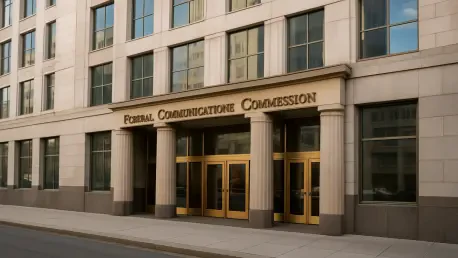In a pivotal legislative session, the Senate has approved a significant piece of budget legislation known as the One Big Beautiful Bill Act, closely associated with President Trump. This legislation, passed on July 1, has sparked widespread debate due to controversial provisions regarding spectrum reallocation and tax cuts. While the bill has found favor among significant players in the wireless industry, it has also drawn criticism from consumer advocacy groups and smaller industry stakeholders concerned about the potential impacts on current technological services and infrastructure.
Spectrum Reallocation Sparks Debate
Wireless Industry Welcomes New Opportunities
Central to the recently passed legislation is the contentious issue of reallocating spectrum. The Senate’s version mandates that the Federal Communications Commission (FCC) auction off 800 megahertz of spectrum. This move is welcomed by major wireless carriers eager to expand their infrastructure and accelerate the deployment of 5G services nationwide. The revenue from these auctions is projected to be a robust $85 billion, largely intended to fund the bill’s tax cut provisions. For organizations like CTIA, which represents leading wireless entities, the dual focus on spectrum and tax advantages represents a lucrative opportunity for increased investment in the burgeoning wireless sector. The rapid expansion of wireless infrastructure and 5G services could herald a new era of technological advancement prompted by this legislation’s implementation.
Concerns from Spectrum Advocates and Small Providers
Despite the enthusiasm from major wireless carriers, not all stakeholders share similar optimism regarding the spectrum auction. Opponents, including advocates for shared and unlicensed spectrum, have raised substantial apprehensions. The Senate’s legislation does not protect certain spectrum bands, such as the crucial 6 GHz band and the shared Citizens Broadband Radio Service (CBRS) band. These are vital to industries relying on Wi-Fi and other services, raising concerns about interference and accessibility if reallocated to powerful 5G providers. Entities like Public Knowledge, a consumer advocacy group, have voiced criticisms, urging the restoration of specific protections that the House had initially included in its version of the bill. This unrest highlights a deep division over prioritizing innovation and access versus fiscal gains from spectrum sales.
The Political Battle and Industry Impact
Tensions Between Large Carriers and Smaller ISPs
Discontent extends to smaller industry players, such as cable companies and wireless internet service providers, who view the Senate’s measures as favoring large cellular operators unfairly. Organizations like WISPA, representing small wireless ISPs, warn of the challenges these auctions pose for smaller enterprises striving to bridge the digital divide, particularly in rural America. The fear is that reallocating key bands like 6 GHz and CBRS will undermine existing investments and jeopardize crucial broadband services in underserved regions. There is significant alarm about the potential disruptions to technological innovations that focus on inclusivity and widespread connectivity, often led by smaller and local players in the field.
Legislative Hurdles in the House’s Chambers
As the legislation progresses to the House, where Republicans maintain a delicate majority, further hurdles loom. Despite the optimism among GOP leaders regarding its passage, the divides between the House and Senate versions could ignite intense debates. Beyond spectrum allocations, there are potential contentious discussions about provisions preventing states from regulating Artificial Intelligence companies. Diverse priorities within the legislative and commercial specters suggest that achieving consensus on the final form of the bill could be complex. The differences highlight the broader theme of technological advancement clashing with consumer protections and shared innovation across varied industrial landscapes within the United States.
Navigating Technological Progress and Legislative Challenges
Balancing Technological and Economic Objectives
The ongoing discourse around the One Big Beautiful Bill Act underscores the intricate balance needed between driving technological infrastructure and maintaining protections for existing services and community interests. While major wireless firms may accelerate their rollout capabilities through substantial spectrum gains, the threat of reallocating shared spectrum introduces significant challenges for smaller ISPs and advocates defending current technological innovation and access. The broader economic implications weigh heavily as lawmakers navigate potential fiscal benefits from spectrum sales against long-term strategic advancements imperative for future growth.
Future Pathways and Legislative Adjustments
During a critical legislative session, the Senate has passed an important budget measure called the One Big Beautiful Bill Act, closely linked to President Trump. Approved on July 1, this legislation has ignited widespread discussion due to its divisive provisions concerning spectrum reallocation and tax reductions. The bill is well-received by major wireless industry players who stand to benefit from the new spectrum policies and lowered taxes, which they argue will enable further innovation and expansion. However, not everyone greets the legislation favorably. Consumer advocacy organizations and smaller businesses within the industry have voiced significant concern. They argue that the changes could adversely affect existing technological services and infrastructure, leading to decreased competition and potentially higher costs for consumers. As the debate intensifies, the bill’s implications for the balance between fostering industrial growth and protecting consumer interests continue to be fiercely contested on both sides of the issue.









